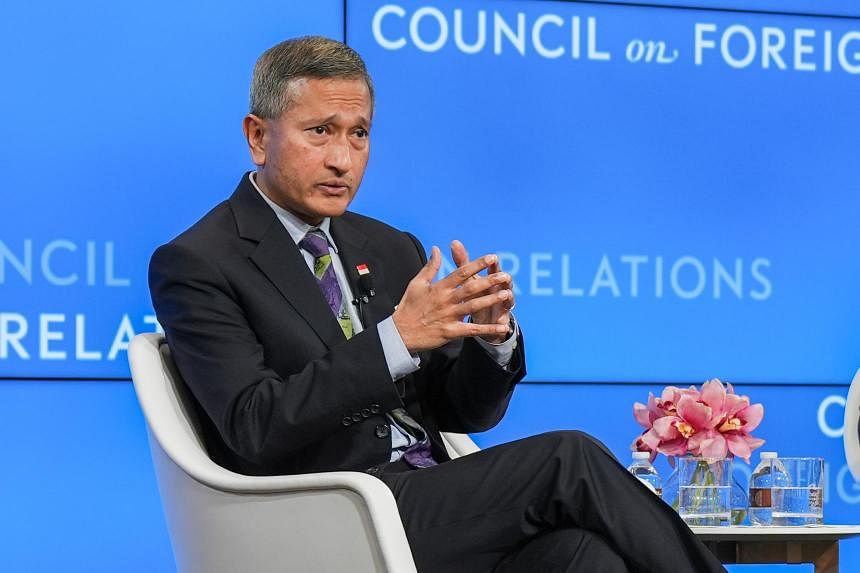WASHINGTON – Singapore wants “overlapping circles of friends” in South-east Asia rather than Cold War-style lines drawn between the United States and China that would force countries in the region to take sides, said Foreign Minister Vivian Balakrishnan in Washington on Thursday.
“We want to give both the United States and China and Europe… real stakes in the peace, prosperity and development of South-east Asia. By giving everyone an incentive to create peace and development in South-east Asia, we also hope that a stable balance of power will be achieved,” he said in an hour-long dialogue organised by the Washington-based Council on Foreign Relations think-tank.
His comments to an audience of foreign policy professionals come amid intensifying rivalry between the US and China. The rising tensions between the two superpowers have made it harder for them to manage relations.
Dr Balakrishnan, who is on a working visit to the US until next Tuesday, said the world was shifting from an international order in which the US was the sole dominant power, to a multipolar one with emerging powers such as China and India.
Given this new configuration, “we should not be trapped by binary false choices” between contending powers, he said, adding: “Everyone’s trying to feel their way to compete and cooperate without confrontation.”
Multilateral institutions and rules are still needed in this new world order, but they should be updated to suit the times, he said. What should be avoided is a situation where supply chains are split into two, with each superpower claiming its own system in a quest for self-sufficiency, he added.
Dr Balakrishnan noted that the Group of Seven had recently called for “de-risking” from China’s economy, while moderator David Sanger of the The New York Times noted that the Biden administration had rolled out bans on chip exports to China. Beijing views this as a form of containment.
“I understand the anxieties on both sides. The ironic thing is that sometimes each side’s anxiety about being less vulnerable creates a self-fulfilling prophecy… but bifurcation will not work,” Dr Balakrishnan said, noting that South-east Asia was of the view that such decoupling would be disastrous.
He began his visit by meeting senior climate officials in the Biden administration on Wednesday, as well as Democrat and Republican lawmakers who focus on Asia and China legislation.
On Thursday, he also met Deputy Secretary of State Wendy Sherman, the second-highest ranking US diplomat.
They reaffirmed the strength of their countries’ strategic partnership and its effectiveness in confronting major challenges, such as Russia’s war against Ukraine and defending the international rules-based order, said the US State Department.
It added in a statement that they discussed how their countries could address the threat of synthetic drugs, and highlighted the importance of cooperation through multilateral fora such as Asean and economic initiatives like the US-led Indo-Pacific Economic Framework.
Dr Balakrishnan is expected to meet Secretary of State Antony Blinken on Friday, before the top diplomat travels to Beijing on the weekend to meet senior Chinese officials, in an effort to manage US-China relations.
Mr Blinken’s original visit was to have taken place in February, but it was cancelled amid a diplomatic row over a Chinese balloon flying over the US, which was shot down.
At Thursday’s event, Dr Balakrishnan welcomed Mr Blinken’s visit to China, adding that such in-person meetings were necessary, especially in the light of tensions over thorny subjects such as Taiwan. China sees the island as a renegade province to be reunified, by force if necessary.
“Conversations and honest-to-goodness looking at each other’s eyes, shaking hands, and explaining each other’s perspectives and anxieties is essential, but not sufficient to resolve these conflicts,” said Dr Balakrishnan.
“Both presidents are not spoiling for a fight. But both presidents have domestic political considerations and international credibility (to think about),” he said, referring to US President Joe Biden and Chinese President Xi Jinping.
During his time in the US, Dr Balakrishnan will also visit New York, where he will deliver Singapore’s national statement on marine biodiversity at the United Nations next Monday.
He will also meet UN Secretary-General Antonio Guterres and UN General Assembly president Csaba Korosi while there.
Singapore’s Ministry of Foreign Affairs said in a statement that Dr Balakrishnan’s visit will build on the robust and multifaceted relationship between Singapore and the US, and explore ways to deepen their cooperation in various fields.


